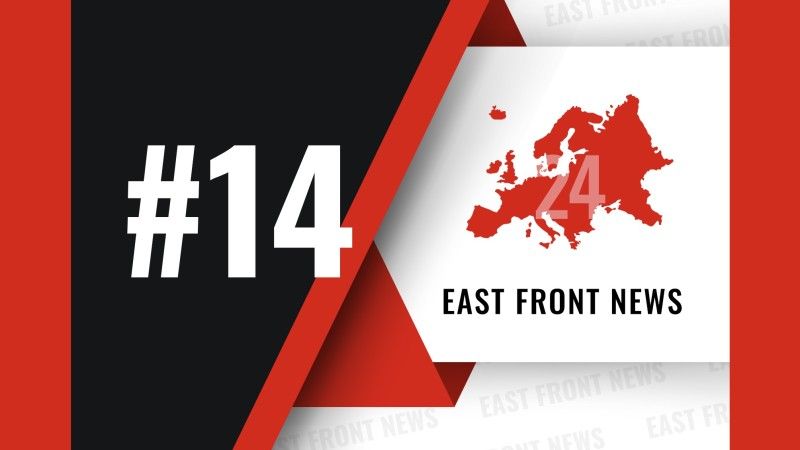Armed Forces
East Front News #14: Polish-Korean Deals for Drones and Rockets, FA-50PL Photos Revealed, US Loan for Apache

East Front News is a weekly newsletter summarizing the past week’s most important events concerning security and the situation in the Central and Eastern Europe region. It includes original opinions and comments, along with key news items significant from a Polish perspective. If you would like to receive this newsletter, please sign up by clicking
Poland increases defence exports
For another consecutive year, Polish arms exports are rising. Similar to last year, the driving force behind this trend is Ukraine’s war-driven demand for weapons and ammunition. Ukraine was the top importer of Polish arms in 2023, purchasing weapons worth €1.419 billion. The U.S. ranked second with €118 million, followed by Spain (€26 million), and Germany (€24 million). Other notable importers include Norway (€21 million), Switzerland (€21 million), the Czech Republic (€19 million), Latvia (€18 million), and France (€16 million). Remaining countries made smaller procurements in Poland, below €10 million.
The MFA’s report highlights both the value of export licenses issued and the actual export value. There were major discrepancies between these values, as in previous years. In 2023, licenses worth €10.788 billion were issued, while the actual export value was only €1.753 billion - 16% of the licensed amount. Part of the export licensed in 2023 will be taking place in the future, but most won’t be. Historical data supports this. In 2018, 31% of the licensed exports were realized, 20% in 2019, 28% in 2020, 9% in 2021, and 21% in 2022. While the overall financial performance of Poland’s arms industry in 2022–2023 has improved significantly compared to earlier weaker years, this is primarily due to the war in Ukraine. Worryingly, aside from Ukraine, Poland’s arms industry has not yet found other large markets for its products.
Polish high-ranking delegation visits Republic of Korea. Discussions on K2 Main Battle Tank and munitions production
A Polish government delegation, led by Paweł Bejda, Secretary of State in the Ministry of Defence, traveled to the Republic of Korea. The intergovernmental talks focused on cooperation between the two countries in key modernization programs of the Polish Armed Forces. The visit of the Polish delegation, headed by Deputy Minister Paweł Bejda, began with a meeting with Minister Seok Jonggun, head of the Defense Acquisition Program Administration (DAPA). The minister, responsible for key projects related to South Korea’s defence policy, played a crucial role in discussions on cooperation with Poland regarding the modernization and development of the Armed Forces.
As the Polish MoD highlighted, during the meeting both sides discussed the status of the most important defense programs that Poland and South Korea are jointly working on. One of the key topics of the meeting was the production of large-caliber ammunition in Poland, which plays a strategic role in ensuring the country’s defense capabilities. The talks also covered the production of K2 tanks by the Polish defense industry.
Polish WB Group exports Warmate loitering munitions to Korea
WB Group has signed an agreement with representatives of South Korea’s DAPA (Defense Acquisition Program Administration) for the purchase of Warmate 3 loitering munitions, the Polish manufacturer announced. South Korea is one of the most prestigious clients for Polish weapon systems, at least among those officially known. Warmate systems are already well-recognized worldwide. Poland has purchased them, as have export clients such as Ukraine, an „unknown NATO client” (likely Turkiye), an „unknown Middle Eastern client,” the United Arab Emirates, and more recently India and Georgia. The systems have been used not only in the war in Ukraine, but footage and photos suggest they have also been deployed in Libya and Nagorno-Karabakh.
The contract was signed on the first day of the KADEX exhibition (Korea Army International Defense Industry Exhibition), held at the headquarters of ROKAF in Gyeryongdae. The signatories of the contract were Piotr Wojciechowski, CEO of WB Group, and Jae Joon Chung, Director General of DAPA. The ceremony was also attended by representatives of the defence ministries of Poland and South Korea. Poland was represented by Paweł Bejda, Secretary of State at the Ministry of National Defense, responsible for the technical modernization of the Polish Armed Forces. As WB Group reported in its statement, the order includes ten sets with nearly two hundred Warmate 3 strike systems (unmanned aerial vehicles). The order includes both strike and training versions of these munitions. The value of the contract is unknown, but unofficial estimates suggest it could be around PLN 100 million.
US Loan for Polish Apache helicopters
Poland and the United States have concluded a direct loan agreement under the Foreign Military Financing programme for USD 3.08 billion, the money is earmarked for the purchase of AH-64 Apache attack helicopters, the Ministry of Defence has announced. This is the third recent loan related to the purchase of US military equipment. The previous agreement was signed on 1 July this year. The USD 2 billion granted then is earmarked for the purchase of US air defence systems. In total, the US government has granted Poland funds under a direct loan of USD 7.08 billion. As the defence ministry pointed out, Poland is »the largest beneficiary of this mechanism in recent years«.
Poland signed in August a FMS deal for 96 Apache Guardian attack helicopters worth USD 10 billion. This agreement will result in Poland being the second largest user of Apache around the world (the first one is US). The deliveries are to take place between 2028 and 2032.
Joint Rocket Production Agreement between Korea and Poland
WB Group and the Korean company Hanwha Aerospace have signed an executive agreement specifying detailed arrangements for the creation of a Polish-Korean joint venture. The goal is to manufacture localized munitions for rocket artillery. The agreement was signed at the KADEX fair on October 2. On behalf of WB Electronics (as the leading company of WB Group), it was signed by President Piotr Wojciechowski. Hanwha Aerospace was represented by General Director Son Jae Il. The signing took place in the presence of Paweł Bejda, Secretary of State at the Ministry of National Defense, and Hyun Ki Cho, a representative of DAPA (Defense Acquisition Program Administration), emphasizing the support of government bodies from both countries.
The establishment of the production facility will be combined with the transfer of technology and know-how to Polish industry, as well as the further development of the CGR-080’s (the 239 mm rocket that is to be produced by the joint venture) design and production. An element of the project also involves the development and implementation of new types of rocket ammunition, according to the needs of the Ministry of Defence.
First photos of FA-50PL light attack aircraft revealed
The editorial team at Defence24.pl received a photograph from the production line in Sacheon, located at the main factory of the FA-50 aircraft manufacturer, Korean Aerospace Industries. It depicts the first currently produced FA-50 aircraft in the ultimate PL version. The jet has the „FA-50PL” designation visible on its tail and bears the number 5013, making it the first of the PL version aircraft. Previously delivered to Poland were aircraft of the GF (Gap Filler) version, which had tactical numbers ranging from 5001 to 5012. As the photo clearly shows, the airframe is already assembled and stands on its own landing gear.
The jet is being fitted with components. In the open sections, electrical wiring is visible. Behind the aircraft, a tail of another FA-50, without any designations, can be seen. It cannot be ruled out that it also belongs to the aircraft being built for Poland. Unlike the airframe in the foreground, the one in the background already has its tail assembly installed.
The next phase of the war in Lebanon and the polish PKW
The latest escalation in the Israel-Hezbollah conflict began with attacks on Hezbollah’s communication devices and Lebanese photovoltaic installations, followed by an air campaign and targeted strikes on Hezbollah leadership, leading to the long-anticipated ground invasion of Lebanon on 30 September. While global attention focuses on military operations and the humanitarian crisis, Poland’s priority is its 250-strong PKW contingent, part of the UNIFIL mission, which also protects the Polish embassy in Beirut. Their main tasks include civilian protection, ceasefire monitoring, and support for Lebanese forces, with a focus on the »Blue Line« demarcation zone. Polish soldiers, mainly from the 17th Wielkopolska Mechanised Brigade, work alongside Irish, Hungarian, and Maltese troops in the IRISHPOLBATT battalion. Despite growing tensions, including Iranian missile strikes on Israel, Defence Minister Władysław Kosiniak-Kamysz assured that Poland remains in close contact with other UN mission participants, with no plans for withdrawal. Deputy Minister Cezary Tomczyk confirmed Polish troops are stationed away from the conflict areas affected by the Iranian strikes.
CyberDay2024
On 2 October 2024, the Cyber24 Day Conference, organized by the Defence24 Group, took place at the Warsaw Presidential Hotel, bringing together over 1,000 domestic and international experts to discuss cyber security in both military and civilian sectors. The event saw participation from key figures in Polish ministries and the National Security Office, with a notable session featuring Deputy Prime Minister and Minister of Digitalisation Krzysztof Gawkowski. He emphasized the importance of preserving human and scientific capital to ensure Poland’s cyberspace is properly managed and highlighted the growing role of AI in crisis coordination, using this year’s Lower Silesian floods as an example. Gawkowski also announced that the National Cyber Security System Act was on the verge of being enacted.
Jacek Siewiera, head of the National Security Bureau, described AI and cyber security advancements as part of the 4th industrial revolution, stressing the importance of long-term state policies beyond single government terms. He also emphasized the need to develop offensive cyber capabilities through the Cyber Defence Forces Component Command and special services. Cezary Tomczyk, Secretary of State at the Ministry of National Defence, highlighted Ukraine’s experience in the cyber domain as a model for Poland, underscoring the ongoing challenges of disinformation, propaganda, and digital hygiene for internet users.
New NATO Secretary General
On October 1st, after a decade of service, Jens Stoltenberg stepped down as Secretary General of NATO, passing the role to Mark Rutte, former Prime Minister of the Netherlands. Rutte takes the helm at a critical moment in NATO’s history, shaped by the war in Ukraine, instability in the Middle East, and growing tensions around Taiwan. These geopolitical challenges will influence the alliance’s future policies and the role of its key member, the United States. One of Rutte’s main tasks will be to ensure member states remain committed to strengthening their defence capabilities. Russia’s invasion of Ukraine in February 2022 was a stark reminder to NATO members that the era of peace in Europe had ended, forcing them to recognize the need for self-reliance in defence. Given the global scope of U.S. security commitments, Europe must invest in its own security, a priority that the new Secretary General must advocate.
During his time as Prime Minister, Rutte led the Netherlands in taking a firm stand with Ukraine, including the decision to provide Kyiv with F-16 fighter jets. As NATO Secretary General, he has emphasized that supporting Ukraine will remain a top priority, highlighting the need for increased alliance involvement on its eastern flank, which is most vulnerable to hybrid and provocative actions. His leadership will be essential in ensuring the alliance adapts to these threats while maintaining unity among member states.
If you would like to receive this newsletter, please sign up by clicking .
East Front News is a weekly newsletter and article on Defence24.com summarizing the past week’s most important events concerning security and the situation in the Central and Eastern Europe region. It includes original opinions and comments, along with key news items significant from a Polish perspective.
Aleksander Olech, PhD & Jakub Palowski, Deputy Ed. in Chief
